Hubspot vs Mixpanel
August 20, 2023 | Author: Sandeep Sharma
17

Any question you can ask about your data, Mixpanel can answer. There are many metrics that measure engagement; page views are not one of them. Make your product better by measuring actions, not page views. Mixpanel's power lies in giving you the ability to learn more from your data by being able to ask increasingly important and complex questions. Most analytics products limit insights to basic trend lines, showing for example "number of homepage visits" over time. Mixpanel goes further by enabling you to ask more of your data.
HubSpot and Mixpanel are both powerful tools that serve different purposes in the world of marketing and analytics. HubSpot is an all-in-one marketing automation platform that offers a wide range of tools for marketing, sales, and customer service. It provides features like email marketing, lead generation, CRM, social media management, content creation, and analytics. HubSpot's focus is on attracting, engaging, and nurturing leads throughout the customer journey, with a strong emphasis on inbound marketing strategies.
Mixpanel, on the other hand, is a user analytics platform that specializes in event-based tracking and analysis. It allows businesses to track user interactions, conduct funnel analysis, and analyze user behavior within their digital products. Mixpanel offers features like cohort analysis, user segmentation, A/B testing, and behavioral analytics. Its focus is on understanding user behavior and optimizing the product experience based on data-driven insights.
See also: Top 10 Web Analytics software
Mixpanel, on the other hand, is a user analytics platform that specializes in event-based tracking and analysis. It allows businesses to track user interactions, conduct funnel analysis, and analyze user behavior within their digital products. Mixpanel offers features like cohort analysis, user segmentation, A/B testing, and behavioral analytics. Its focus is on understanding user behavior and optimizing the product experience based on data-driven insights.
See also: Top 10 Web Analytics software
Hubspot vs Mixpanel in our news:
2023. HubSpot unveils strategy to integrate AI across the platform
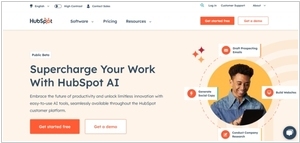
HubSpot, the marketing and CRM platform, has unveiled its comprehensive AI strategy known as HubSpot AI. While the incorporation of AI elements has been an ongoing effort for HubSpot and other enterprise SaaS vendors, the advent of technologies like ChatGPT has prompted HubSpot to adopt a more extensive approach while retaining earlier features. The CRM database stores valuable company data, enabling users to gain insights into customer profiles, encompassing basic information, purchase history, customer service interactions, and more. HubSpot AI encompasses a four-pronged strategy, starting with content assistants that assist users in generating various content types across the platform. Additionally, AI agents, currently in different development stages, aim to automate customer service tasks and answer queries. The third component, AI Insights, provides predictive analytics, such as identifying customers likely to churn or make a purchase, a capability integrated into the platform over time.
2023. Mixpanel moves into marketing data with its latest product
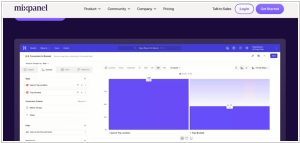
Mixpanel has traditionally offered product teams information about product usage, but as third-party data and cookies have come to an end, product data has become more valuable to other departments within the company. As a result, Mixpanel has developed a new product called Mixpanel Marketing Analytics, which makes it easier for marketing teams to access this data. This enables marketing teams to use the data to gain a better understanding of customers and improve their overall experience. Mixpanel has streamlined the querying process and created job-specific templates within the interface to make it easier for both product and marketing teams to access and utilize the data in a way that is meaningful to them.
2020. HubSpot’s new end-to-end sales hub aims to simplify CRM for mid-market customers
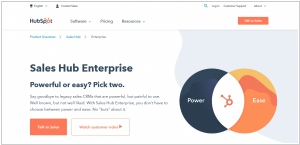
HubSpot, renowned for its role in shaping the concept of inbound marketing, has unveiled the HubSpot Sales Hub Enterprise. While the company has been providing a CRM tool for five years, which has successfully addressed the usability concerns of salespeople, the new offering aims to deliver a comprehensive approach that caters to the needs of not only sales professionals but also management and system administrators. HubSpot recognizes that larger players in the industry, such as Adobe, Salesforce, and SAP, typically acquire various components of the technology stack and integrate them into their solutions, or customers themselves piece together different elements. In contrast, HubSpot believes that developing a unified, integrated solution in-house will naturally result in a more user-friendly experience.
2020. HubSpot unveils new content management system for marketers
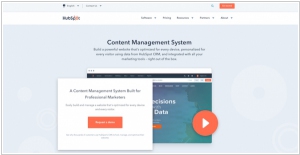
HubSpot, a renowned inbound marketing firm, has introduced a dedicated content management system (CMS) specifically designed to simplify the process of adding and updating content for marketing professionals. While content management has always been a fundamental aspect of HubSpot's offerings, this new CMS has been developed from scratch with marketers in mind. It provides developers with the flexibility to use their preferred programming languages while leveraging the modular structure of the HubSpot CMS. Simultaneously, the user-friendly interface empowers marketers to make frequent changes necessary for modern websites.
2018. HubSpot added customer service tools to its marketing platform
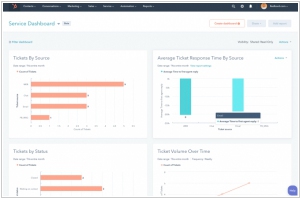
HubSpot is venturing beyond sales and marketing by officially introducing its Service Hub, a comprehensive solution for managing customer service. This expansion includes an all-in-one inbox for organizing all customer communications, a bot-builder to automate certain customer interactions, features for developing a company knowledge base (which can be utilized by the bot-builder), survey creation tools, and a dashboard for monitoring the performance of your service team. Service Hub is seamlessly integrated with HubSpot's existing products, enabling businesses to track customer interactions across sales, marketing, and support.
2017. HubSpot unveiled Conversations
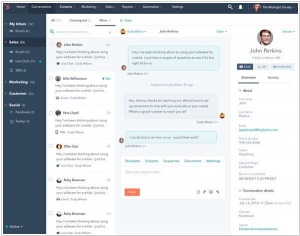
CRM, marketing, sales, and customer experience provider HubSpot has introduced a range of product updates, including notable integrations with Facebook for advertising purposes, Shopify for ecommerce functionalities, and the introduction of a new tool called "Conversations." The Conversations tool, facilitated by chatbots, consolidates customer messages into a single inbox, representing the evolution of HubSpot's live chat platform. This unified messaging system becomes crucial during significant transitions, such as the handoff from sales to support. Key features of Conversations include seamless integration with HubSpot CRM and the ability to create chatbots, leveraging the technology obtained from HubSpot's recent acquisition of the chatbot platform, Motion AI. These updates aim to enhance customer interactions and streamline communication processes within the HubSpot platform.
2017. Marketing platform HubSpot acquires AI startup Kemvi
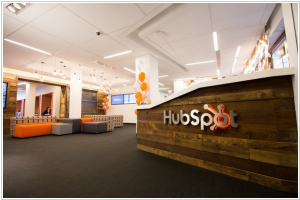
Inbound marketing and sales platform HubSpot has made an acquisition of Kemvi, a startup that utilizes artificial intelligence and machine learning to assist sales teams. A short while ago, Kemvi introduced DeepGraph, a product that examines public data to enable salespeople in identifying the optimal time (such as after a job transition or the release of an article) to connect with potential customers. Additionally, it takes proactive measures to verify leads. HubSpot was actively seeking innovative ways to incorporate AI technology into its platform as a means to combat competitors. The acquisition of Kemvi was especially attractive to HubSpot due to its ability to address a genuine requirement among salespeople.
2015. Mixpanel introduced codeless mobile analytics
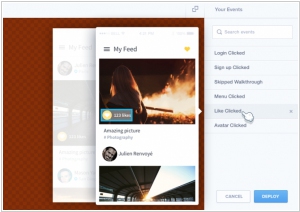
Mobile analytics service Mixpanel has introduced a new feature designed to simplify the customization of its analytics tools for mobile businesses, eliminating the need for additional code. With the introduction of Codeless Mobile Analytics, customers can utilize a user-friendly point-and-click interface to identify and track specific interactions within their Android or iOS apps. Once the Mixpanel SDK is installed, any subsequent modifications can be implemented immediately without requiring an update or approval from the App Store. This empowers optimization, testing, and marketing teams to make adjustments to their app analytics dashboard independently, without relying on developers for assistance.
2015. HubSpot launches own CRM system
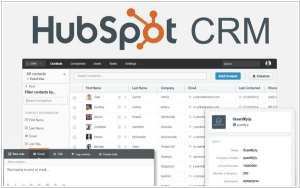
HubSpot, a renowned company recognized for its marketing tools, has officially launched its CRM product, moving it out of the beta phase. The CRM tool is available for free, while HubSpot's sales "acceleration" tool, Sidekick, is priced at $50 per seat per month. HubSpot describes the CRM tool as designed to assist sales representatives in minimizing the tedious aspects of data entry and interaction management. The tool automatically captures data from the sales process and organizes it in a chronological format. This strategy of providing free software to companies and subsequently upselling their IT departments has proven successful for software companies like Dropbox and Box. Although there are still costs associated with the sales process, having products integrated into more businesses helps reduce certain barriers.
2014. Mixpanel adds mobile A/B testing to its analytics platform
The web and mobile analytics service Mixpanel is unveiling a new feature today, catering to mobile developers seeking to experiment with different variations of their applications. Making modifications to the app is a straightforward process. For instance, relocating a button is as simple as dragging it, while implementing more advanced changes, such as altering in-game physics, remains relatively speedy. This simplicity is crucial as it enables marketers, product managers, and non-engineers to utilize these tools as well. By eliminating the need to rely on developers for testing promising ideas, the process becomes more accessible. Moreover, the A/B testing service is seamlessly integrated with Mixpanel's analytics platform, particularly leveraging user-specific data. This integration facilitates targeted testing by allowing changes to be tested on specific user groups.




